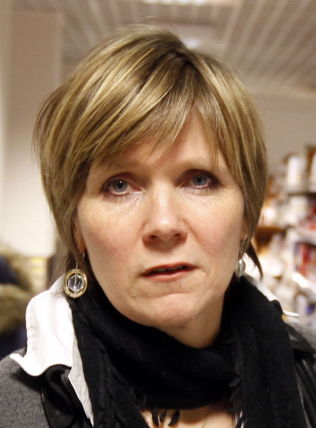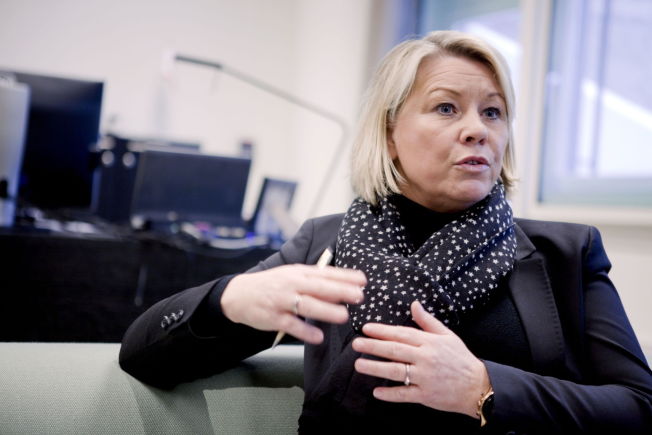It will open for Uber and free competition, but it may mean that the taxi ride is somewhat more expensive.
“Now – more than forty years after that price controls were replaced with belief competition in the rest of the economy – Norwegian Competition Authority believes, therefore, that the time is ripe to discontinue price control also in the taxi industry, “is the main conclusion of the report Competition Authority has made, as VG gained visibility.
The report is sent as a recommendation to Minister of Industry.
– Everyone should get run
– We want to remove the limitations of today price regulated permit system provides. We therefore propose that all that will propel open and seriously shall drive a cab, said competition director Christine B. Meyer.
– Does that mean everyone in reality be able to run cab?
– Yes, in reality, but we will impose stringent quality requirements so that passengers will feel completely secure when they put themselves into the cab . We envisage that it opened several mainstream companies with employees and drivers that permit is tied to the company and not to each individual car.
– This means that you also open for public approval of Uber?
– Yes, we believe it must be opened for new innovative solutions that meet current and future technologies. But we set high standards for safety and driver conduct. In the future will largely ordering preceding mobile and via apps where customers both get information about when the taxi is available and price.
In reality, she turning current arrangement completely upside:
Today it is clear limitations on the number of licenses, to ensure that drivers who get permits are secured income. The main rule is that whoever holds a taxi license has as main. Meanwhile duties licensee having cab car running at the times permit authority determines.
– We want a system whereby restrictions on licenses removed. Today it is the individual county sitting and guessing how many licenses as it is right to have. We want a system where it is the market that decides.
– Will not give too many taxis and hopeless competition?
– No, then we will drop it stands taxis queuing much of the day at the stops, as we see every day now; companies will adapt to the market and to a greater extent be present when the public need cab, says technical director Kjell Sunnevåg Competition Authority, which has been responsible for the report.
In it they partly on experience when Swedes deregulated taxi market in 1990.
VG waited two hours on Uber
Fear not ” drosjedød “
Between 1990 and 2007, the taxi prices more than the consumer price index.

Competition Director: Christine B. Meyer Competition Authority.
Photo: Hallgeir Vågenes , VG
– We are not saying prices will inevitably go down, but we believe we have a better functioning market with competition on price and availability. This presupposes that it also made some efforts to make customers better informed about prices, she said.
– You also refers to a report from the Consumer Council, who explains that the regulation in Sweden led to “drosjedød” in parts of the districts Sweden and that some communities of practice were left without cab offers?
– It is one of the reasons why we want to soften the requirement to taxi driving to be a main acquisition: We want people for example can be a farmer and drive taxi business on the side. We believe it will be a good solution in many places in the districts Norway, says Meyer.
She says they want to create a customized, flexible and modern framework that encourages competition and innovation for the benefit of taxi customers.
– The requirements for taxi license must be directed towards ensure passenger safety needs, both in terms driver and vehicle, she said.
– Remove regulation throughout the country
Until 2000, all the taxi market in Norway subject to price controls. After 2000, however, several geographical areas has been exempted controls. This includes areas Oslo / Akershus, Oslo region, Trondheim, Bergen region Stavanger region, large parts of Østfold, Haugesund and Kristiansand.
In these areas, taxis and taxi companies free to set their own appraisals, but the supply side is still authority determined through means testing.
– We recommend that the price regulation should be removed in the rest of the country. In addition, permits restrictions to be removed in the country.
– How to ensure that it does not pop up a number of dishonest people who want a part of a free taxi market?
– We will set strict standards for conduct and safety, so that everyone who orders a taxi to know that they can feel safe. It will be easy to get a permit if they satisfy the safety requirements, but it is also easy to lose. Frivolous players are weeded out – and regulations must be strictly enforced, says Meyer.
Viewing Gardermoen
They are keen to adapt taxi industry user needs. They write:
“Price Applications for smartphones that calculates the price of the trip from various taxi firms will make comparison much easier for customers. The customer can then easily make a conscious choice based on price. Such application may also take account of parameters other than price that is important to the customer, such as latency. In recent years, several such applications appeared in the market. “
– We experienced the other day that it created an award portal at the taxi stand at the airport where the customers can choose between different taxi company by entering where they properly and get a list with prices. It worked just fine, says Meyer.
Price Portals and drosjeapp’er can provide positive effects for customers by
price transparency is improved. For example, electricity portal an important tool for creating competition in the electricity market as this was deregulated in the 90s.
It is proposed that the reform gradually implemented, where one first starts with repeal
needs test and adapt permit requirements in the areas that are currently not subject
controls.

POSITIVE: Industry Minister Monica Mæland (H).
Photo: Javad M. Parsa , VG
– If we can reduce government regulations making it easier for market participants and cheaper for consumers, it is good. Such simplification work is an important priority for the government, says trade minister Monica Mæland (H).
She maintains that she as competition minister is concerned effective competition for the benefit of consumers.
– The Competition Authority have under the Competition Act an independent duty to point anticompetitive effects of government actions and regulations. I consider the report on the taxi market as a natural follow-up of this.
– Taxi trade is regulated by several different authorities, among others Ministry, counties and the Competition Authority. Competition Authority’s report provides a good opportunity to look at how this control system can be designed in the best possible way, says Mæland.
– Talk about dreams

CRITICAL: Chairman Roger Hansen in Norwegian Transport Workers Federation.
Photo: Norwegian Transport Workers Federation
Director Roger Hansen in Norwegian Transport Workers Federation (LO), which organizes taxi drivers, butcher proposal.
– Talk about dreams. If anyone can get permission we get chaos and higher prices, with lots of rogue actors. Already today there are too many licenses, including Oslo. The number must instead down, says Hansen.
He lists opposite consequences than the audit foreshadows:
** – It comes several large companies, because there will be so many in market that it is not profitable to be large. It becomes a wild fight in the street for customers. This will open for extensive pirate driving.
** – What they say about security is nonsense: it will stick with safe car, an app and a price list.
** – Prices will go up because there are so many players to earn money in the same market.
** – A farmer will not be able to afford to invest in a car to drive on to say. Some have such an arrangement today, with various transports in rural areas. But they do it because they have a stable local market. When everyone can run, stability will disappear and the willingness to take risks decreases. Therefore we risk drosjedød in parts of districts, his judgment.
No comments:
Post a Comment